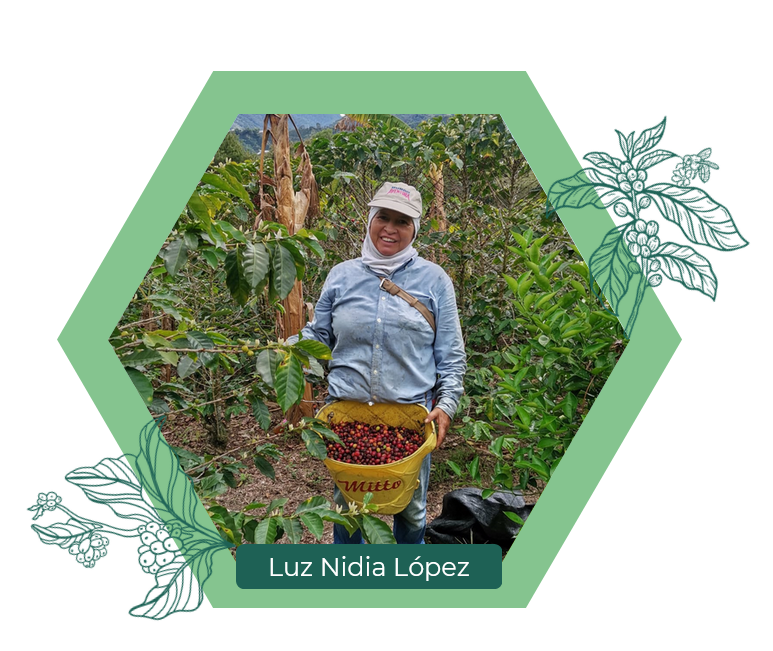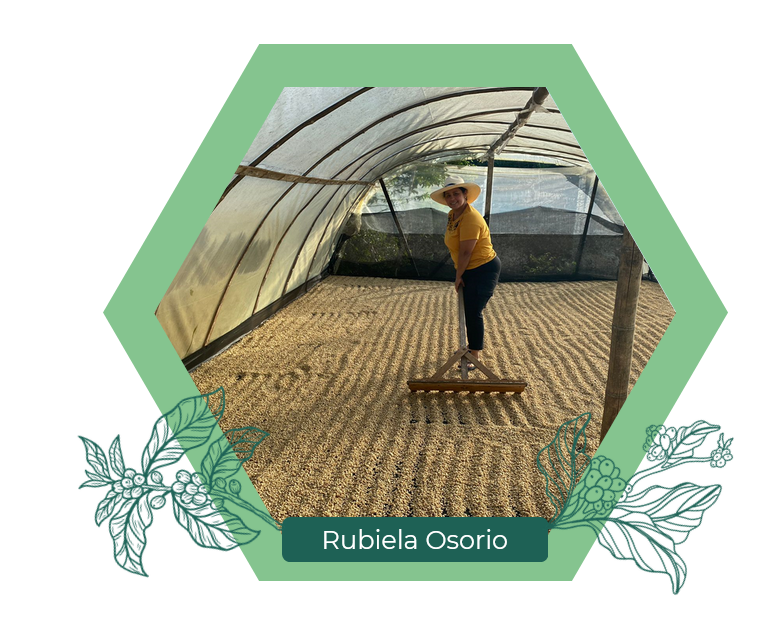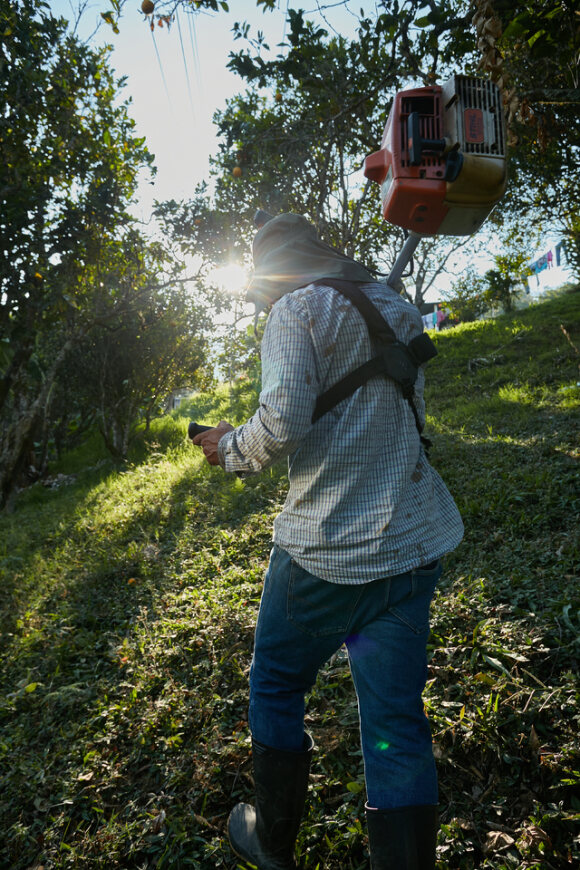


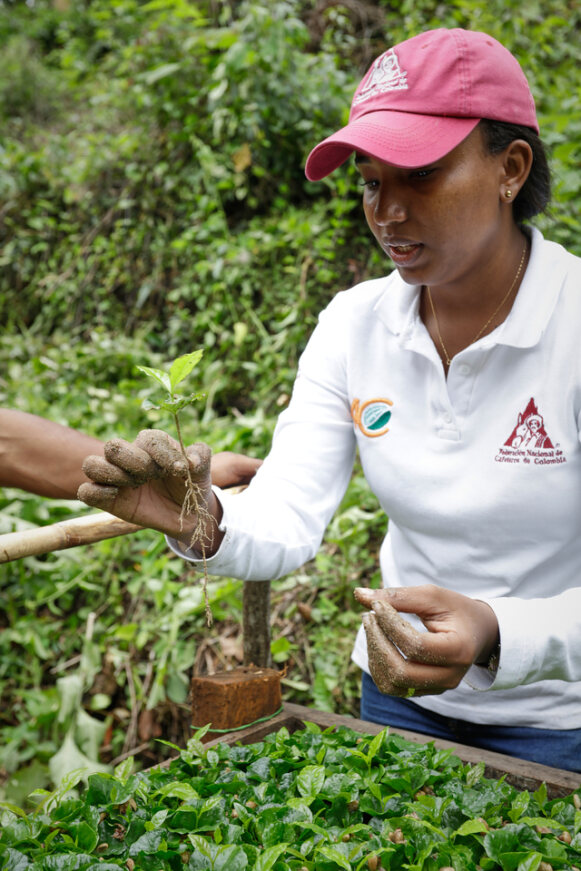

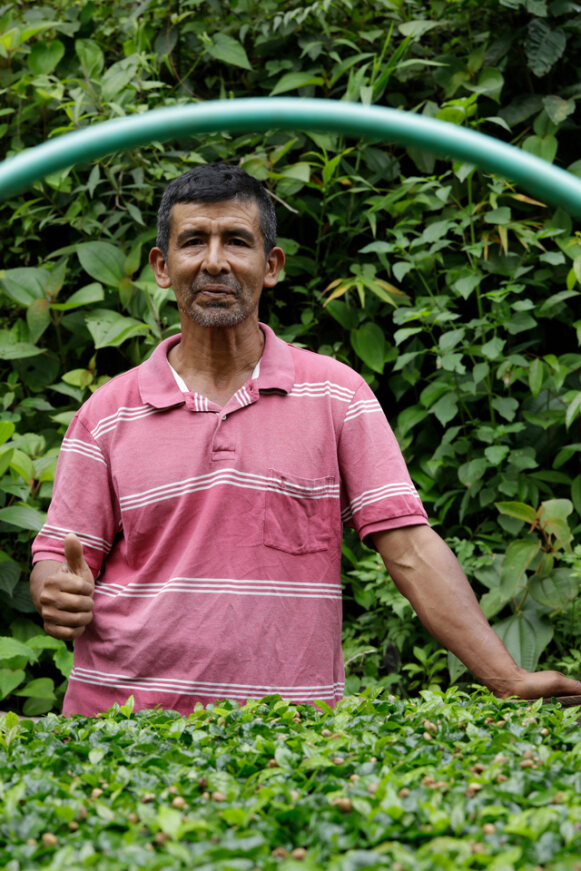


4C is proud to announce its achievement of equivalence recognition against the Sustainable Agriculture Initiative (SAI) Platform’s Farm Sustainability Assessment (FSA) Version 3.0.
The SAI Platform is a global organization committed to advancing sustainable agriculture practices, and its Farm Sustainability Assessment is a comprehensive tool that evaluates and benchmarks sustainability performance across various agricultural sectors.
The 4C certification operates on a model of continuous improvement wherein the certified groups of farmers constantly work towards reaching the next higher sustainability level. This means that certified groups of farmers need to comply with increasingly thorough and strict criteria over subsequent certification cycles. Every three years the audits for re-certification include additional checkpoints and a new improvement plan is set up each time with objectives to achieve until the next audit.
Following the benchmarking, based on this progressive system, 4C has achieved:
- FSA Gold Level Equivalence for its certification standard for sustainability level 3
- FSA Silver Level Equivalence for level 1 of the certification
The FSA Gold Level Equivalence recognition is granted to organizations that demonstrate exceptional performance in implementing sustainable practices, aligning with the SAI Platform’s rigorous standards.
This recognition, through a thorough evaluation process, underscores 4C’s commitment to fostering sustainable practices and highlights its dedication to advancing environmental and social responsibility within the coffee and cocoa sector.
“We are honoured to receive the FSA Gold Level Equivalence recognition from the SAI Platform for our commitment to promoting sustainable practices in coffee production and supply chains. This achievement reflects our ongoing efforts to drive positive impact in the sector and contribute to a more sustainable and resilient future,” said Norbert Schmitz, Managing Director at 4C Services.
“I would like to congratulate 4C Services on their benchmarking equivalence to the FSA. The Gold Level Equivalence of level 3 exemplifies 4C’s commitment to thriving and sustainable coffee and cocoa sectors. With this also being the first coffee-specific benchmark against FSA 3.0, it also shows that 4C continues to be a leader”, added Joe Iveson, FSA Manager, Sustainable Agriculture Initiative Platform.
Empowering Female Coffee Farmers: The Transformative Impact of the 4C Gender Equality Add-On in Colombia
Women play a vital role in global coffee production, being responsible for up to 70% of the direct production work during planting, harvesting, processing, sorting, and grading (depending on the region). In spite of their fundamental work, their level of participation in farm decision-making and negotiation processes still tends to be very low. Furthermore, in many coffee producing regions, limitations to access key resources such as land, financial resources, and education are still prevailing, which entails negative consequences not only on the income, health, food security and education of coffee farming families, but also on coffee yields and quality. Therefore, the 4C Code of Conduct has established specific criteria to tackle the root cause of discrimination and inequality. Going a step further, the 4C Gender Equality (GE) Add-On continues this path of female empowerment by fostering the transformation of social norms translating them into actions.
One of the first 4C Units to obtain the 4C Gender Equality Add-On certification was a group of female farmers in the department of Huila, Colombia, managed by Sucden Colombia. Subsequently, we would like to put a spotlight on these pioneer women by giving them room to share their stories and how the 4C GE certification has transformed their realities:
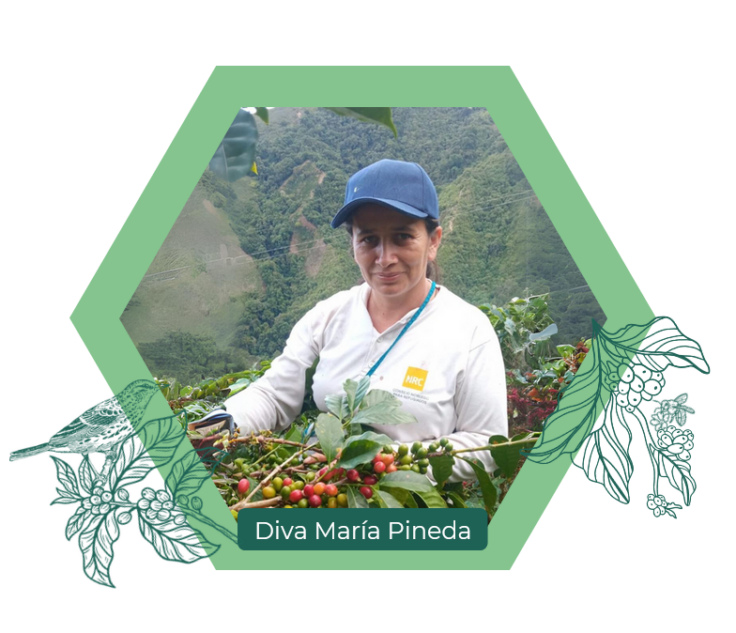 Diva Pineda who is 42 years old and has spent 30 years of those being a coffee grower, emphasises that “the training received has served to empower the women of the community and the talk of gender equity allows us to see life from a different perspective, in which the farm is no longer only the responsibility of the husband, but from a more family-based approach that allows us to become more involved in all the processes”(Individual interview: DIVA MARÍA PINEDA)
Diva Pineda who is 42 years old and has spent 30 years of those being a coffee grower, emphasises that “the training received has served to empower the women of the community and the talk of gender equity allows us to see life from a different perspective, in which the farm is no longer only the responsibility of the husband, but from a more family-based approach that allows us to become more involved in all the processes”(Individual interview: DIVA MARÍA PINEDA)
This is also what Rubiela Osorio (47) confirms, who has also been a coffee farmer for 25 years, stating as “this process has provided us with tools that promote our leadership and our empowerment to face challenges and come up with new ideas” (Individual interview: RUBIELA OSORIO PERDOMO). Luz López (44), a mother of two children, stresses that the greatest learning she has taken away from this experience is to understand the importance of leadership in decision making and she mentions that they feel more empowered to continue working to reduce gender gaps. (Individual interview: LUZ NIDIA LÓPEZ PARRA)
These women, who agree that they have experienced many difficulties in their work during the decades of experience they have accumulated in coffee production, see in the GE Add-On an opportunity to generate a positive impact not only in the lives of women, but also in their communities. Their expectations for the future focus on the possibility of selling differentiated coffee with a gender focus, generating derivative products with their own brand, and improving their associative structures to achieve greater economic stability and improve their quality of life.
Responding to these expectations, the 4C Gender Equality Add-On represents a tool to empower women coffee farmers and to continue working to transform gender-related social norms. The participation of this group of female farmers sets a significant precedent in the transformation for gender equality in the Colombian coffee industry.
Continuing to support initiatives that promote gender equality in coffee production is crucial to bring about sustainable change in the industry. Supporting green coffee suppliers in adopting the 4C Gender Equality Add-On and implementing recommended improvements is a direct step towards more sustainable coffee and a real commitment to gender equality.
Join us on this journey towards gender equality. Together, we can make a difference and improve conditions in coffee production worldwide. To get started, contact us at info@4c-services.org
Empoderando a las Mujeres Caficultoras: El Impacto Transformador del Complemento 4C de Igualdad de Género 4C en Colombia
En la industria global del café, las mujeres desempeñan roles vitales, llegando a encargarse de hasta el 70% (dependiendo de la región) de las labores directas de la producción en las etapas de plantación, recolección, procesamiento, clasificación. A pesar de eso, su nivel de participación en los procesos de toma de decisiones de las fincas y de negociación para la comercialización del tiende a ser aún muy bajo. Además, en muchas regiones productoras de café siguen prevaleciendo las limitaciones para acceder a recursos clave como la tierra, los recursos financieros y la educación, lo que conlleva consecuencias negativas no sólo para los ingresos, la salud, la seguridad alimentaria y la educación de las familias caficultoras, sino también para el rendimiento y la calidad del café. Ante esta problemática, el Código de Conducta 4C ha establecido criterios específicos para atajar de raíz la discriminación y la desigualdad. Al profundizar aún más, el Complemento de Igualdad de Género (GE) 4C continúa este camino de empoderamiento femenino fomentando la transformación de las normas sociales traduciéndolas en acciones.
Una de las primeras Unidades 4C en obtener la certificación complementaria 4C Igualdad de Género fue un grupo de agricultoras del departamento de Huila, Colombia, gestionado por Sucden Colombia. A continuación, nos gustaría poner el foco en estas mujeres pioneras dándoles espacio para compartir sus historias y cómo la certificación 4C GE ha transformado sus realidades:
Diva Pineda, de 42 años, de los cuales 30 ha sido caficultora, enfatiza que “las capacitaciones recibidas han servido para el empoderamiento de las mujeres de la comunidad y el hablar de la equidad de género nos permite ver la vida desde un enfoque diferente en el cual la finca ya no solo es responsabilidad del esposo si no desde un enfoque más familiar que nos permite involucrarnos más en todos los procesos”. (Entrevista individual: DIVA MARÍA PINEDA). Así también lo comenta Rubiela Osorio (47), quien también lleva 25 años como caficultora y dice que “este proceso nos ha brindado herramientas que fomentan el liderazgo de nosotras y nuestro empoderamiento para enfrentar retos y tener nuevas ideas”. (Entrevista individual: RUBIELA OSORIO PERDOMO)
Luz López (44), madre de dos hijos destaca que el aprendizaje más grande que ha sacado de esta experiencia es entender la importancia del liderazgo en la toma de decisiones y menciona que se sienten más empoderadas para seguir trabajando en la reducción de las brechas de género. (Entrevista individual: LUZ NIDIA LÓPEZ PARRA)
Estas mujeres quienes coinciden en que son muchas las dificultades que han experimentado en su trabajo durante las décadas de experiencia que han acumulado en la producción de café y ven en el GE Add-On una oportunidad para generar un impacto positivo no solo en la vida de las mujeres, sino también en sus comunidades. Sus expectativas para el futuro se enfocan en la posibilidad de vender café diferenciado con un enfoque de género, generar productos derivados con su propia marca y mejorar sus estructuras asociativas para alcanzar mayor estabilidad económica y mejorar su calidad de vida.
Dando respuesta a estas expectativas el Complemento 4C de Igualdad de Género se presenta como una herramienta para empoderar a las mujeres caficultoras y seguir trabajando en la transformación de las normas sociales relacionadas con el género. La participación de este grupo de agricultoras sienta un precedente significativo en la transformación para la igualdad de género en la industria cafetera colombiana.
Continuar respaldando iniciativas que promuevan la igualdad de género en la producción de café es crucial para generar un cambio sostenible en la industria. Apoyar a los proveedores de café verde en la adopción del Complemento de Igualdad de Género 4C y en la implementación de mejoras recomendadas es un paso directo hacia un café más sostenible y un compromiso real con la igualdad de género.
Únase a nosotros en este camino hacia la igualdad de género. Juntos, podemos marcar la diferencia y mejorar las condiciones en la producción de café a nivel mundial. Para comenzar, contáctenos en info@4c-services.org.
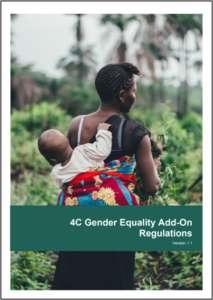 In response to valuable feedback received from stakeholders during the public consultation period from January to April 2023, 4C has undertaken a comprehensive review of its Gender Equality (GE) Add-On, making significant updates to enhance its practical application and relevance in diverse contexts.
In response to valuable feedback received from stakeholders during the public consultation period from January to April 2023, 4C has undertaken a comprehensive review of its Gender Equality (GE) Add-On, making significant updates to enhance its practical application and relevance in diverse contexts.
The feedback, primarily received from Certification Bodies (CBs) conducting initial audits and Managing Entities (ME) undergoing GE certification of groups of farmers, as well as other interested parties, highlighted crucial aspects related to the application, local conditions, and the clarity of normative documents, particularly within the Colombian context.
The new version of the 4C Gender Equality Add-On System Document V 1.1. will be valid from 1.1.2024.
Key Changes Made:
| Feedback Obtained: | Changes Made: | |
| 4C Glossary: | Definition lacking for GE-specific terms, e.g., immediate family members. | Added GE Add-On relevant terms to improve clarity. |
| 4C GE Checklist:
|
Insecurities regarding when certain checkpoints can be considered non applicable (marked as N/A) and uncertainties in interpreting specific checkpoints.
|
Provided additional explanations in the verification guidance. Optimized wording of checkpoints to address all target groups, including women, men, boys, and girls. |
| BPM GE:
|
Difficulties in collecting and maintaining disaggregated data; challenges in systematically analyzing the collected data.
|
Adjusted the tabs in the BPM that are designated to collect disaggregated data. Adjustments were made in the purpose of improving user-friendliness, organization and clarity of data. Additionally, the analysis conducted via the BPM upload and analysis tool was extended to display the disaggregated data in a useful way. |
| 4C Gender Equality Add-On Regulations:
|
Questions on the term “Gender Equality” versus “Gender Equity”; uncertainties about handling the Improvement Plan (IP) for core certification and IP_GE; uncertainties about specific terms and monitoring of IP_GE. | Added further term definitions and explanations how to fill in the BPM_GE. Details on the particularities of the IP_GE were added, as well as further explanations on how to define the risk level for GE audits.
|
| Newly Developed: Guidance Document for Auditors on Vulnerable Groups:
|
Need for additional guidance on how data obtained from the BPM_GE feeds into the risk assessment for GE audits.
|
Developed a dedicated guidance document with guiding questions to assist auditors through the process, emphasizing a holistic approach to assessing vulnerable groups |
These revisions and additions underscore 4C’s commitment to continuous improvement, ensuring that the GE Add-On is established as a robust and adaptable tool for promoting gender equality across diverse coffee production settings.
For further details or inquiries, we encourage you to reach out for clarification on the updated documents: info@4c-services.org
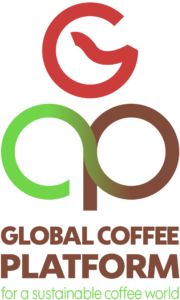 Bonn, Germany – July 7th, 2023: Today, the Global Coffee Platform officially announced its recognition of 4C as equivalent to the GCP Coffee Sustainability Reference Code (Coffee SR Code) in the category of 3rd party assurance.
Bonn, Germany – July 7th, 2023: Today, the Global Coffee Platform officially announced its recognition of 4C as equivalent to the GCP Coffee Sustainability Reference Code (Coffee SR Code) in the category of 3rd party assurance.
As Norbert Schmitz, the Managing Director of 4C stated: “Being recognized by GCP’s Equivalence Mechanism 2.0 holds immense significance for 4C. Receiving this recognition reinforces 4C position as a reliable and comprehensive 3rd party certification system and strengthens our commitment to collaborating with the coffee sector to advance sustainability. We are dedicated to continuing working closely with GCP and other stakeholders to drive positive change, creating a more sustainable future for coffee.”
The Equivalence Mechanism, Coffee SR Code, and GCP Collective Reporting on Sustainable Coffee Purchases were developed by GCP to establish a sector-wide understanding of the foundations for coffee sustainability. They aim to provide a common language and a recognized framework for sustainability in green coffee production and processing. The Equivalence Mechanism 2.0, released by GCP in November of last year proposed stricter sustainability and operational criteria. As a result, 4C has been reevaluating and aligning its system to remain equivalent to the Coffee SR Code and the Operational Criteria of EM 2.0. The assessment was conducted in collaboration with the International Trade Centre to ensure the integrity of the process.
Upon successful assessment and recognition by GCP, 4C is now again eligible to be included in the annual GCP Collective Reporting on Sustainable Coffee Purchases. This reporting initiative serves as a means for roasters and retailers to align their practices and contribute to global coffee sustainability efforts. The recognition process by GCP’s Equivalence Mechanism 2.0 is an important step to provide a sector-wide reference for sustainability in the economic, social, and environmental aspects of sustainable green coffee production and processing worldwide. According to Annette Pensel, GCP Executive Director, the Global Coffee Platform “applauds the action by these GCP Members to step up and align their sustainability schemes through the Coffee SR Code and GCP Equivalence Mechanism.”
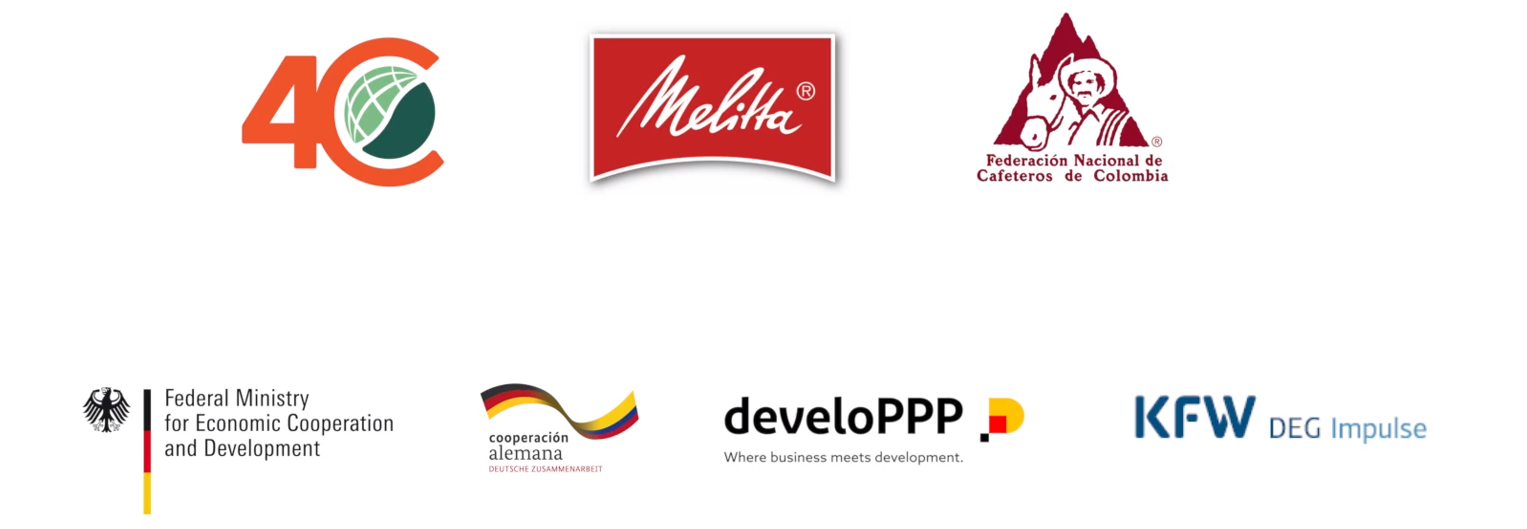
Colombian coffee is prized for its complex yet well-balanced flavor profiles and high-quality Arabica beans. The country’s reputation for high standards has helped it become one of the most popular choices among the three billion cups consumed daily and the third-largest coffee producer in the world, according to the International Trade Commission.
However, the younger generation is turning away from coffee production due to several social, environmental, and economic challenges. Socially, many young adults view agriculture, including coffee farming, as lacking development prospects that align with their aspirations. Moreover, coffee cultivation is no longer considered a profitable business due to various factors such as unstable coffee prices, limited access to more lucrative markets, and climate change-related issues like pests, low production, and loss of biodiversity. These factors are compounded by the lack of access to modern technologies and financing options, as well as limited education in rural areas, which hinder young people’s ability to improve their production and increase their resilience to these challenges.
To address this concerning trend, 4C partnered with Melitta Europe GmbH & Co. KG – Coffee Division to launch a three-year sustainability project, “Improving the working and living conditions of small coffee farmers” in Colombia’s Magdalena Department.

View from one of the coffee farms in Magdalena
“During our initial assessments, we found the Magdalena Department had the greatest need for intervention,” said Kristin Lipps, Sustainability Manager at 4C. “Within the coffee-growing regions analyzed in Colombia, this department has some of the highest rates of rural poverty, youth unemployment and lack of access to education in rural areas. This discourages the younger generation from getting involved in coffee cultivation and thus keeping the local tradition alive. Our aim with this project is to make the sector more attractive to young adults, contributing to the long-term economic and ecological viability of small coffee farms”.
Along with enhancing sustainable agricultural practices and market uptake, the project partners developed various courses that seek to professionalize young adults aged 18-30 in Magdalena’s coffee communities, helping them to diversify their income through non-farming activities
Magdalena is a region renowned for its diverse landscapes, ranging from the vast plains in the south to the crystal-clear waters of the Caribbean Sea in the north and the towering Sierra Nevada de Santa Marta mountain range at its heart. It is in the lush tropical foothills of these mountains that the department’s more than 4,000 coffee farmers are found but only 4% of them are under the age of 30. Recognizing the potential of the scenic landscape, combined with the interest of visitors to Colombia to learn about coffee cultivation and processing, the focus of the first course was on the development of tourism activities. This aims to provide young people with alternatives and tools to diversify their income through non-agricultural activities, while contributing to the sustainable development of the coffee sector in Colombia. Besides offering accommodation and various activities for tourists, the young adults also took initiative to diversify their product range.
The course focused on ecotourism through online sessions conducted in spring 2022. The topics included community tourism and agrotourism, product development and package design, sustainable innovation, storytelling, and digital strategies. Additionally, the 138 participants had the opportunity to present their already-developed tourism projects to help them adapt the lessons to their individual needs.
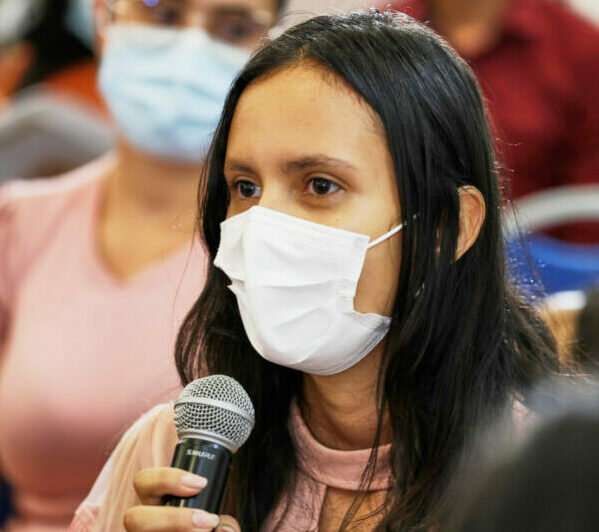
Gina Alejandra Rodríguez during the Coffee & Tourism course
“The diploma course has allowed me to learn many more aspects about coffee and how to complement it with tourism, since these can go hand-in-hand,” says Gina Alejandra Rodríguez, a 22-year-old multi-generational coffee grower.
Besides offering accommodation and various activities for tourists, the young adults also took initiative to diversify their product range. For instance, some developed their own coffee brand, directly selling the roasted and packaged coffee to the consumer or started making other products from coffee beans such as tea, sweets, spread or even jewelry. Another product they are developing further is honey made by bees on the coffee farms. These products are sold in local coffee shops where freshly brewed coffee, desserts and cakes are offered.
During the course, Rodríguez presented an agrotourism project that she and her family are implementing on their farm, which offers lodging services, ecological hikes and bird watching parallel to their regular coffee production activities. Rodríguez notes that she wants this project “to be an example for my community” by encouraging other young people to venture into new initiatives to advance their livelihoods.
In addition, to uphold Colombian coffee’s high quality, young adults participated in a coffee quality and tasting course which took place in September 2022. It was an immersive experience for the 60 participants, taking them deep into the world of coffee assessment and sensory analysis. From learning about quality assessment, and coffee threshing, to recognizing flavor profiles and defects in the coffee. The participants gained an in-depth knowledge of physical evaluation and sensory analysis methods. In addition, they received equipment to continue practicing at home and a self-study course to further hone their skills.
Yesenia Gómez Almanza, a 29-year-old coffee grower, says she believes the youth are the future of coffee production because they can “bring fresh and renewed ideas”. She highlights how learning skills like coffee evaluation are critical for Colombia’s coffee sector to grow, especially in Magdalena. “[The course] was very important, rewarding and enriching, as it allowed us to learn how the coffee production process affects the quality of the coffee,” Gómez Almanza says.
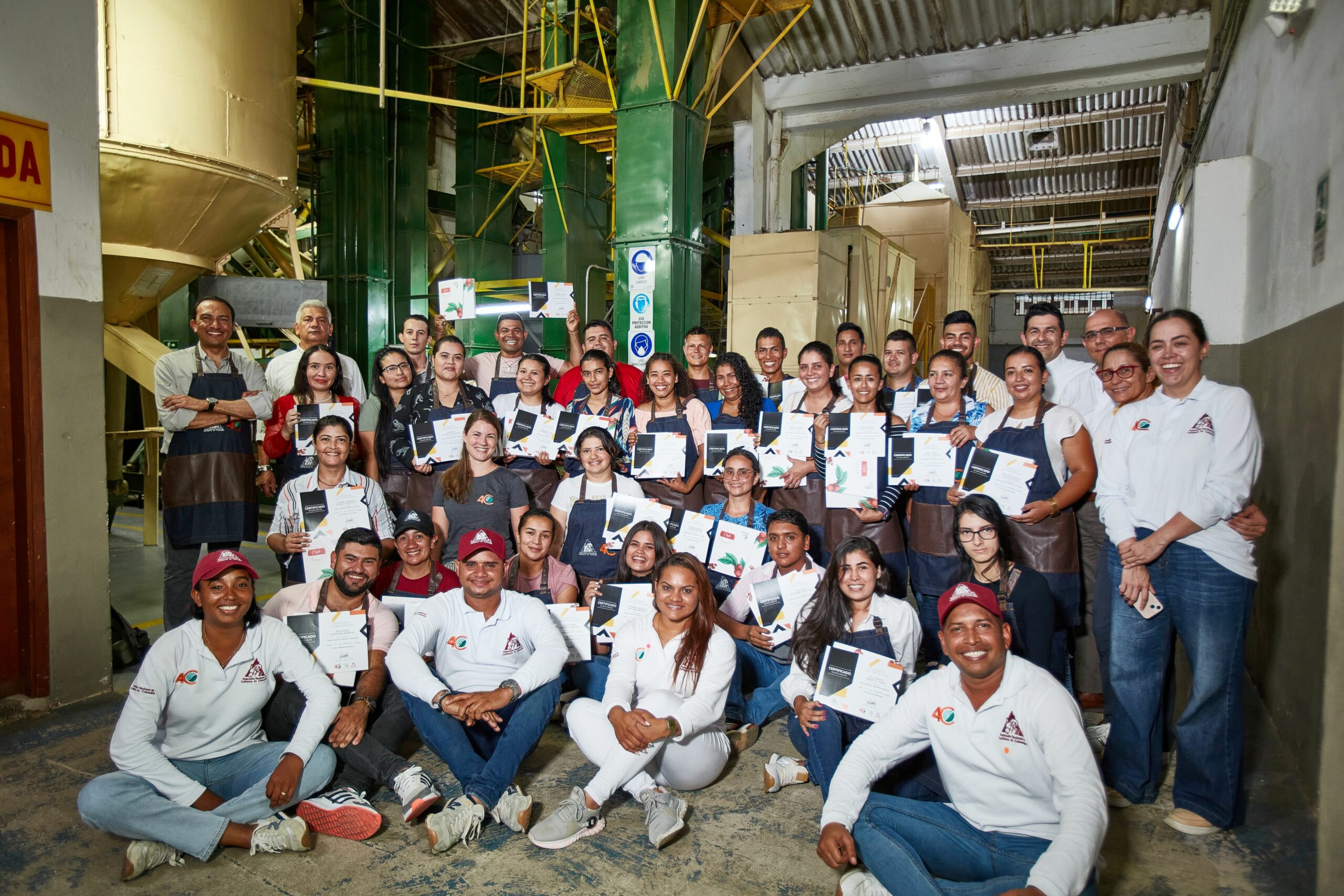
Participants of Quality & Coffee Tasting course in September 2022
Another course in February 2023 covered website development and marketing strategies. The one-day in-presence course was requested by those with already developed tourism initiatives following the ecotourism course. Many of the participants currently use social media for advertising their projects, but they want to close digital gaps by learning how to create and maintain a website to bring in more international customers.
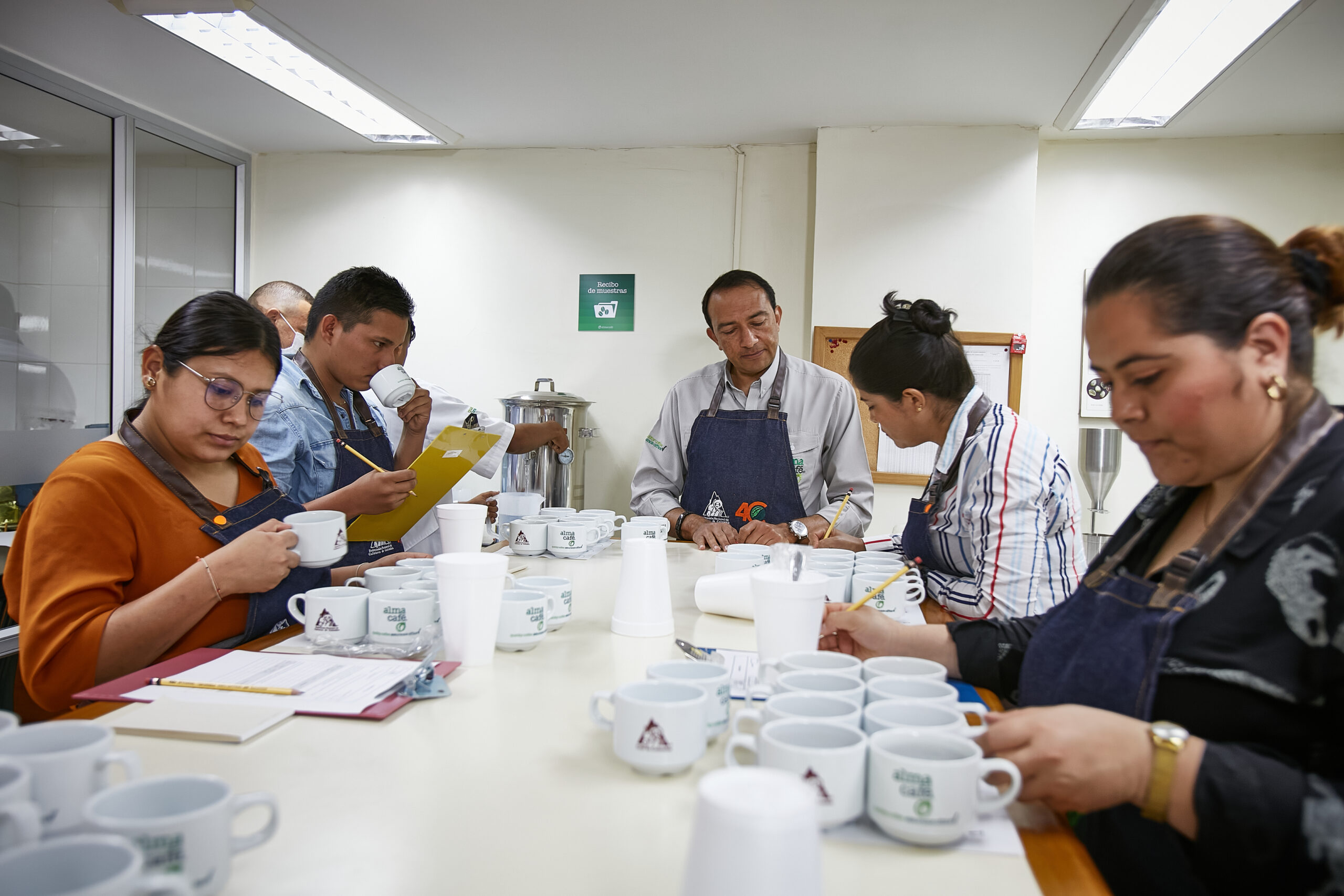
Young adults practicing coffee tasting
The final course spans two days in February and March 2023. It will focus on business and entrepreneurship skills like conducting value chain analysis, understanding their business models, developing future business plans and exploring strengths and weaknesses.
With these different training courses, the project is taking a comprehensive approach to empower young coffee farmers in Magdalena with the skills and knowledge they need to make their businesses thrive.
The project—co-financed by DEG Impulse gGmbH with funds from the develoPPP program of the German Federal Ministry for Economic Cooperation and Development (BMZ)—will be completed in April 2023. Alongside the training designed to motivate around 250 young adults to remain part of a sustainable coffee production process, the project seeks to improve approximately 500 coffee producers’ agricultural practices to achieve better yields of certified sustainable and deforestation-free climate-compatible coffee. Activities included visiting and providing individual consultation to farmers and conducting group trainings covering various topics adjusted to the current season and needs of the farmers. Further these farmers achieved the 4C certification in the course of the project. Additionally, Melitta Coffee began sourcing the beans produced by these farmers in early 2022; this coffee is part of the Selection of the Year 2023.
Find more information here: https://www.4c-services.org/about/project-portfolio/

Colombia is the third-largest coffee producer in the world with more than half a million families living from its cultivation. In addition to its undeniable relevance for the national economy, coffee is cultivated in some of the most biodiverse ecosystems, linking it to important ecological values. According to the ITC (International Trade Center), the world drinks up to three billion cups of coffee a day, and this consumption is constantly increasing. While this trend should lead to improved market opportunities for its producers, the instability of green coffee prices combined with the environmental challenges derived from climate change, make it much less attractive for younger generations of Colombians to continue producing coffee. The highly complex distribution chains also mean that producers rarely receive the full benefits from the coffee sales. These conditions particularly affect small producers, who constitute more than 95% of coffee farmers in Colombia. In this context, sustainability certification addresses negative impacts of coffee cultivation on the natural environment and maximizes economic benefits for coffee growing communities by improving the competitiveness of coffee products and facilitating access to international markets.
4C (Common Code for the Coffee Community) is an independent sustainability system, whose main objective is to improve the social, economic, and environmental conditions of coffee production and processing throughout the world. The 4C certification includes independent third-party audits that verify compliance with comprehensive sustainability criteria. The creation of the 4C Code of Conduct was achieved through a participatory, transparent, and balanced consultation process involving various coffee industry stakeholders. At the end of 2021, already more than 300,000 coffee producers around the world have obtained 4C certification.
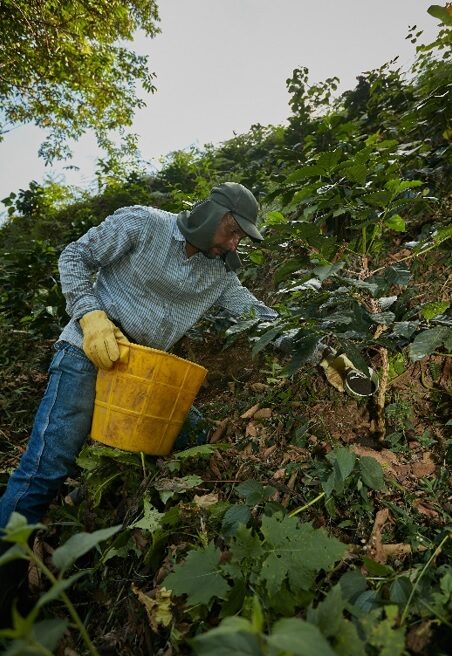
Giovanny Puerta Becerra: beneficiary coffee grower of the 4C project
Recognizing the challenges faced by coffee producers in Colombia, 4C and Melitta Europe GmbH & Co. KG – Coffee Division – initiated the joint project “Improving the working and living conditions of small coffee farmers in Colombia” in mid-2020. It is co-financed by DEG – Deutsche Investitions- und Entwicklungsgesellschaft mbH with funds from the develoPPP program of the German Federal Ministry for Economic Cooperation and Development (BMZ).
Improving sustainable agricultural management
Since the start of the project a combination of group, individual, online, and in-person trainings have been conducted by 4C and its implementing partner the National Federation of Coffee Growers (FNC). Until mid of March 2022, 386 coffee growers have received technical assistance on applying best management practices during individual farm trainings. In addition, online and in-person group trainings have been conducted to support coffee growers in improving agricultural practices and techniques for processing coffee. Among others, the group trainings covered topics like dry and wet processing, marketing strategies, coffee farms renovation, soil management, and occupational health and safety. Moreover, in preparation for the 4C audit, trainings on how to fulfill the requirements of the 4C Code of Conduct were held at the farms and during online workshops.
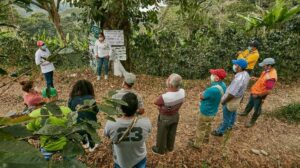
Kenny Gutierrez y Kelly Olaya, project field officers conducting a group training in Vista de Nieve, Santa Marta district
In 2022 the support for coffee growers in the Magdalena region will continue while the aim is also to spread the learnings to further beneficiaries and enable them to gradually improve their management practices and maintain the 4C certification. This will be done through additional visits to farms and group trainings. The group trainings will be conducted by farmer leaders, who are themselves beneficiaries of the project and will share their knowledge to fellow farmers. These farmer leaders were selected based on their commitment to the project and promoting sustainability within the community. Furthermore, the project beneficiaries will also be supported financially to make necessary investments to implement the learnings from the trainings.
4C certification and improved access to European markets
The 4C audit took place between the 2nd and 6th of November 2021 and 437 coffee growers representing 455 small scale farms successfully passed the audit and received the 4C certification. This key result promotes sustainable coffee production in the region, while also raising awareness for the conservation of primary forests and protected areas. It also strengthens the protection of human and labor rights, while fostering more efficient and profitable coffee production. After implementing the improvements to achieve 4C certification, the project beneficiaries were satisfied with the changes they observed on their farms. Walter Guevara, a coffee farmer from Cienaga municipality emphasized: “4C motivates us to conserve the environment and be more organized, which is perhaps something that we have not been doing very much, and above all, it motivates the young people to adopt these practices that are fundamental to conserve nature and to develop ourselves.”
At the beginning of this year, Melitta acquired a first shipment of traceable 4C certified coffee from the beneficiaries of this project at a premium price. Another purchase is expected during the next harvest period lasting from October 2022 to January 2023. The level of premiums that these sales offer to local coffee growers provides a higher profitability, allowing them to cover their operational costs and generate an attractive income. This also enables them to maintain a high level of environmental protection that secures the future for coffee production in the region. The response of the project beneficiaries following the sale of coffee to Melitta was very positive. Alvaro Serrano, a coffee farmer from Cienaga Municipality, noted that “the price premium that the 4C proposal represents here is not offered by anyone else.”
Increasing the attractiveness of the sector for young adults
An additional focus of the project in 2022 is to improve opportunities in the coffee sector for young people in the community. From the end of March 2022, around 100 young adults will participate in an extensive course on promoting ecotourism activities in coffee plantations. The course is jointly organized with FNC and with the participation of ProColombia – a government agency in charge of promoting Colombian international tourism. It will run for around two months and consists of a series of in-person and online training sessions. Participants will be guided by experts from the tourism industry to acquire the necessary knowledge to develop, adapt and strengthen their own tourism business proposal to attract the interest of international markets. Among others, some topics to be covered are strategic business planning, storytelling, marketing, and costing.
Other activities for young adults are planned for this year and include trainings on barista skills, coffee tasting, and entrepreneurship. Young adults will also be supported financially to enable them to implement the learnings from the trainings. “I really like that 4C is motivating our rural youth who were discouraged from continuing with coffee growing and showing them that coffee can indeed be a profitable alternative, and that we ourselves can find a good price for it with the help of 4C certification,” said Diego Hernandez a coffee farmer from Santa Marta Municipality, located in the project region Magdalena.
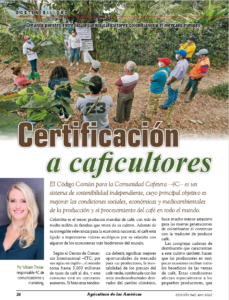
Descargue la versión en español de este artículo:
Creando puentes entre los pequeños caficultores colombianos y el mercado europeo
4C Services is proud to announce the launch of the new 4C Carbon Footprint Add-On which promotes climate friendly coffee cultivation and supply chains. The Add-On allows system users to calculate their carbon footprint, to identify emission reduction options and to use carbon offsetting for remaining emissions.
 The consumer demand for sustainably sourced coffee and transparent and reliable information about its carbon footprint is growing steadily. The coffee industry has already reacted to this, and several brand owners and roasters are implementing respective policies. With the newly developed 4C Carbon Footprint Add-On – the latest voluntary addition to the core 4C code of conduct certification – 4C responds to these developments. It offers companies and their supply chains a tailored solution to understand the current impact of their operations on the climate and proposes solutions on how to reduce and mitigate greenhouse gas (GHG) emissions, as well as communicate these efforts with their consumers.
The consumer demand for sustainably sourced coffee and transparent and reliable information about its carbon footprint is growing steadily. The coffee industry has already reacted to this, and several brand owners and roasters are implementing respective policies. With the newly developed 4C Carbon Footprint Add-On – the latest voluntary addition to the core 4C code of conduct certification – 4C responds to these developments. It offers companies and their supply chains a tailored solution to understand the current impact of their operations on the climate and proposes solutions on how to reduce and mitigate greenhouse gas (GHG) emissions, as well as communicate these efforts with their consumers.
Measuring, quantifying, and assessing GHG emissions is necessary to identify the impact of coffee production on the climate and provides the basis for identifying targeted reduction measures. Decreasing the carbon footprint of coffee cultivation and processing. and implementing carbon compensation mechanisms for unavoidable emissions, are key for achieving climate neutrality in coffee production in the long term.
For the development of the Add-On, recognized methodologies, standards and initiatives were researched and considered, such as ISO 14067:2018, GHG Protocol Product Standard, PAS 2050:2011 and several IPCC guidelines. It is aligned with the guide from the Science Based Target Initiative (SBTi) and the Paris Agreement target to limit global warming to 1.5°C. The methodology developed was tested on the ground by 4C in various pilots.
The participating 4C system users can implement the methodology of this Add-On in four levels, making it possible to apply the 4C Carbon Footprint Add-On gradually and in different arrangements of the coffee value chain.
To start the process, 4C system users, who wish to benefit from the Add-On need to conduct a baseline assessment for the GHG emissions calculation on the unit (farm) level. To reach the second level, the downstream supply chain will be included in the calculation. If the system users chose to proceed to the next level of the certification, they need present an improvement plan, which proposes emission reduction measures. These certified coffee producers may use the claim 4C Climate Friendly Coffee. Remaining emissions can be offset to achieve Climate Neutral Coffee.
4C will also set up Stakeholder Committee to elaborate on and improve the application of the Add-On in practical terms. Interested parties may register here.
4C partners with JDE Peet’s and DEG to reduce GHG emissions and strengthen climate resilience of smallholder producers

4C Services and JDE Peet’s are proud to announce the start of a joint project on “Reducing GHG emissions and increasing yields from Robusta coffee production by 7,000 smallholder farmers and processors in Tanzania”, co-financed by DEG – Deutsche Investitions- und Entwicklungsgesellschaft mbH – with funds of the develoPPP.de program of the German Federal Ministry for Economic Cooperation and Development (BMZ), together with funds of JDE Peet’s and 4C Services GmbH.
The project was successfully launched on 09 August 2021. Its main objective is to reduce GHG emissions from Robusta coffee production by smallholder farmers and processors in Tanzania within the JDE Peet’s supply chain by measuring and assessing the carbon footprint of coffee production, implementing mitigation strategies, supporting market uptake of climate friendly coffee and with this, creating positive socio-environmental benefits for the farmers and local communities of the coffee sector in Tanzania and beyond.
Environmental impact of coffee production in Tanzania and how it is addressed by the project
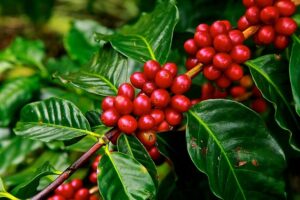
Coffee production has an impact on GHG emissions due to land use change/deforestation, non-regenerative soils which lack the potential to sequester carbon and poor agricultural and processing practices. Coffee cultivation accounts for approx. 90% of the product carbon footprint of roasted coffee. To successfully tackle these challenges, it is crucial to first get an in-depth insight of the drivers of GHG emissions in Robusta coffee production in the region, to then find adequate solutions for reducing these emissions on farm level and throughout the entire supply chain.
In cooperation with the implementing partners Touton S.A. and Karagwe District Cooperative Union (KDCU Ltd.) the project will quantify the carbon footprint of green coffee bean production in the Kagera region in Tanzania and identify potential reduction measures. Such measures will be implemented through the training of master trainers and the set-up of demonstration plots. The measures will be further integrated into the 4C Climate Friendly Coffee Add-on which will also be piloted with the farmers in the region. This will create market opportunities, support farmers in their efforts towards climate change mitigation and adaptation and at the same time facilitate coffee companies to work towards their climate neutrality goals.
“We are very happy to partner with 4C Services, DEG, Touton S.A and KDCU supporting over 7,000 smallholder farmers in Kagera, Tanzania to reduce GHG emissions through sustainable and climate friendly agricultural and processing practices. Tanzania is an important coffee origin that is critical towards safeguarding the rich diversity of coffee.” – Nadia Hoarau-Mwaura, Sustainability Director at JDE Peet’s
“We are very excited that together with our supply chain partners 4C will take action to measure GHG emissions in Robusta coffee production in Tanzania and support 7,000 farmers in the implementation of reduction measures.” – Dr. Norbert Schmitz, 4C Managing Director. “Through this common effort, we want to take the next step to assessing the carbon footprint and making climate friendly coffee supply chains a reality.”
About the develoPPP.de program
 develoPPP.de is a program launched by the German Federal Ministry for Economic Cooperation and Development (BMZ) in 1999 in order to foster the involvement of the private sector in areas where business opportunities and development policy initiatives overlap. DEG is one of the two official partners appointed by BMZ to implement the develoPPP.de program on its behalf.
develoPPP.de is a program launched by the German Federal Ministry for Economic Cooperation and Development (BMZ) in 1999 in order to foster the involvement of the private sector in areas where business opportunities and development policy initiatives overlap. DEG is one of the two official partners appointed by BMZ to implement the develoPPP.de program on its behalf.
For almost 60 years, DEG has been a reliable partner to private-sector enterprises operating in developing and emerging-market countries. Since the launch of the develoPPP.de program, DEG has implemented over 1,000 develoPPP.de projects worldwide.
4C is pleased to announce that the 4C certification will be a recognized partner program of Keurig Dr Pepper (KDP) to support its commitment to 100% responsibly sourced coffee. KDP is a leading beverage company in North America and is committed to sourcing, producing, and distributing beverages responsibly through its “Drink Well. Do Good” corporate responsibility platform. KDP has developed a rigorous set of requirements for the acceptance of independent product-specific standards across its supply chains. After comprehensive benchmarking, the 4C certification was recognized as one of the standards that is well aligned with the KDP Supplier Code of Conduct and additional program considerations laid out by KDP. In addition, KDP will be also be requiring its upstream suppliers to undergo Chain of Custody certification audits conducted by a third party, which is currently voluntary for 4C participants beyond the farm level.
“4C is happy to support KDP in strengthening its supply chain sustainability and promoting human rights and good agricultural practices around the world,” – says Norbert Schmitz, Managing Director at 4C.


“KDP is pleased to announce that the latest evolution of the 4C certification program means that it meets KDP’s requirements for approved Responsible Sourcing partner programs. We look forward to working in partnership with 4C to continuously improve their program and to tackle the significant challenges facing the coffee sector”. – Whitney Kakos, Sr. Manager, Sustainability at Keurig Dr Pepper.
Learn more: Keurig is committed to 100% Responsibly Sourced Coffee
4C partners with Melitta Europa and DEG to foster sustainability of the Colombian coffee production

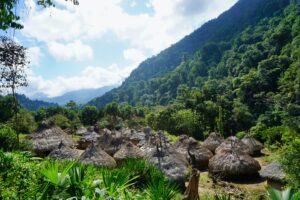 Magdalena is a Colombian department with a magnificent landscape that stretches from a wide plain in the southern area to the Caribbean Sea in the north. The region is known for the topical humid climate which allows productive activities like palm oil, banana and coffee. It also boasts a beautiful mountainous complex of the Sierra Nevada de Santa Marta which is the highest coastal mountain on Earth and one of the country´s most biodiverse regions. However, Magdalena is also one of the departments with the highest rates of rural poverty and youth unemployment in Colombia, as well as one affected greatest by the impact of climate change.
Magdalena is a Colombian department with a magnificent landscape that stretches from a wide plain in the southern area to the Caribbean Sea in the north. The region is known for the topical humid climate which allows productive activities like palm oil, banana and coffee. It also boasts a beautiful mountainous complex of the Sierra Nevada de Santa Marta which is the highest coastal mountain on Earth and one of the country´s most biodiverse regions. However, Magdalena is also one of the departments with the highest rates of rural poverty and youth unemployment in Colombia, as well as one affected greatest by the impact of climate change.
Magdalena is the region that was selected for the implementation of a three-year 4C sustainability project.
This project is conducted by 4C and its partners Melitta Europa GmbH & Co. KG and Deutsche Investitions- und Entwicklungsgesellschaft mbH (DEG) and aims to improve sustainable agricultural management of Colombian coffee growers and market uptake in Europe to contribute to the long-term economic and ecologic viability of smallholder farms, thus, increasing the attractiveness of the sector for young adults.
Decision making supported by remote sensing technology
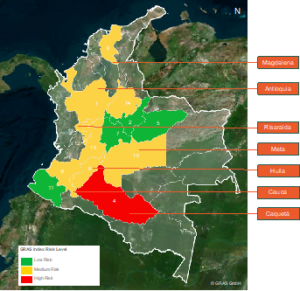 A balanced combination of remote sensing technologies, market links, local synergies and a baseline study were crucial for choosing the focus region of the project.
A balanced combination of remote sensing technologies, market links, local synergies and a baseline study were crucial for choosing the focus region of the project.
Global Risk Assessment Services (GRAS) conducted a “bird´s eye view” analysis and used data on protected areas, high carbon stock areas, potential deforestation, converted grassland and national social indices to define a risk index for each department. For an initial preselection of departments, these results were analysed with Melitta and compared with possible synergies with other similar projects.
Then 4C´s local partners Alliance for Bioversity International (ABC) and the International Center for Tropical Agriculture (CIA) compiled key information on the main social, environmental and economic challenges that make coffee production risky and volatile as well as unappealing for young adults. Major challenges for coffee farmers, found by the study, include high costs of coffee production, low productivity, lack of farm and income diversification, risk of deforestation and negative impact of climate change. The identified drivers for young adults to migrate to the cities and leave coffee production were the unattractiveness of the coffee sector due to heavy work, low income and absence of social recognition as well as the lack of access to capital and land.
Bringing together local and international partners
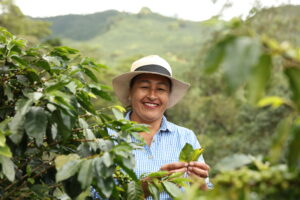 In November 2020, 4C brought together 38 participants from NGOs, companies and local coffee cooperatives at an online multistakeholder workshop to present these findings. The workshop was an opportunity for stakeholders to discuss the main challenges and possible solutions. Furthermore, stakeholders exchanged ideas on how to better integrate youth in the Colombian coffee sector. Following the initial assessments and the workshop, 4C and its partners identified the department of Magdalena as the one with the greatest need for project intervention and defined the most relevant training topics.
In November 2020, 4C brought together 38 participants from NGOs, companies and local coffee cooperatives at an online multistakeholder workshop to present these findings. The workshop was an opportunity for stakeholders to discuss the main challenges and possible solutions. Furthermore, stakeholders exchanged ideas on how to better integrate youth in the Colombian coffee sector. Following the initial assessments and the workshop, 4C and its partners identified the department of Magdalena as the one with the greatest need for project intervention and defined the most relevant training topics.
“Through the active participation of various actors from the coffee industry, including coffee producers, traders, roasters, NGOs and research institutions, we are glad to have received a broad input on the main challenges to be addressed within the training program that we are in the process to develop together with FNC, ABC and NES Naturaleza, as well as input on training methodologies to be applied”, highlights Myriel Camp, Program Manager at 4C Services.
In comparison to the other six departments assessed, Magdalena showed low productivity, the highest rates of rural poverty, youth unemployment and lack of rural education. It was also one of the departments affected greatest by the impact of climate change, a risks losing the remaining forest due to deforestation. A decrease of almost 50% in a suitable area for coffee production is predicted. In addition, coffee productivity in Magdalena amounts to 0.71 tons/hectare, which is only half of that of departments such as Antioquia, Huila and Risaralda. Access to international markets for coffee represents only 2% of the total coffee exports from Colombia, in comparison to 10%-18% in the best performing departments.
When it comes to improved attractiveness of the sector for young adults, the baseline study revealed the demand for greater opportunities in terms of employability and strengthening youth initiatives and access to capital for implementing business ideas in the coffee industry.
“Having identified Magdalena as the project implementation region to best achieve impact on the ground and where the most need for intervention exists, fits into our vision, among other things, to support the market access of the farmers of the project. Magdalena is a region from which we source green coffees. Supporting here with our project to improve the livelihoods of coffee farmers and young adults makes us very happy”, says Jan Rischkopf, Sustainability Manager at Melitta Europa GmbH & Co. KG.
Engaging beneficiaries and local actors
In early 2021, the work in Magdalena began. The project was socialized with the coffee growers committee of Magdalena and with their support the target beneficiaries have been identified. Via radio program, SMS, posters and field visits, farmers and young adults are going to be informed about the project objectives and motivated to participate. Field visits to potential project beneficiaries, planned to start mid-March, will be led by experienced agronomists from the region. Measuring the impact is an important component of the project, the field officers will use a phone application developed by GRAS to collect the baseline data of the selected beneficiaries and in this way measure change over the timeframe of the project.
In addition, the project’s training program is currently under development in cooperation with the Federación Nacional de Cafeteros de Colombia (FNC), one of the main implementing partners of the project. “For the FNC it is a commitment to work for the well-being of Colombian coffee growing families and the development of the country, and therefore we are proud to work with allies such as 4C to generate value through the development of projects that increase the opportunities and profitability of coffee growers,” says Diego Robles Marcucci, Sustainable Trade Specialist at FNC. He added: “Through the Comité de Cafeteros del Magdalena, we work in this coffee-growing department, which includes around 5,000 producers to whom we provide services such as technical assistance in cultivation through the Facilitated Extension Service, purchase guarantees, scientific research and the promotion of Colombian coffee.”
Trainings’ topics, identified during the multistakeholder workshop, include, among others, the adoption of climate-smart agricultural practices and improving marketing and business skills for emerging businesses. The training program is the key component to bring changes in the sector. Different training approaches and methodologies will be applied, ranging from train-the-trainer trainings to demonstration farms serving as training ground and field schools for farmers and young adults. To enable the implementation of the learnings from the training, the project will support these activities with financial contributions for required investments.
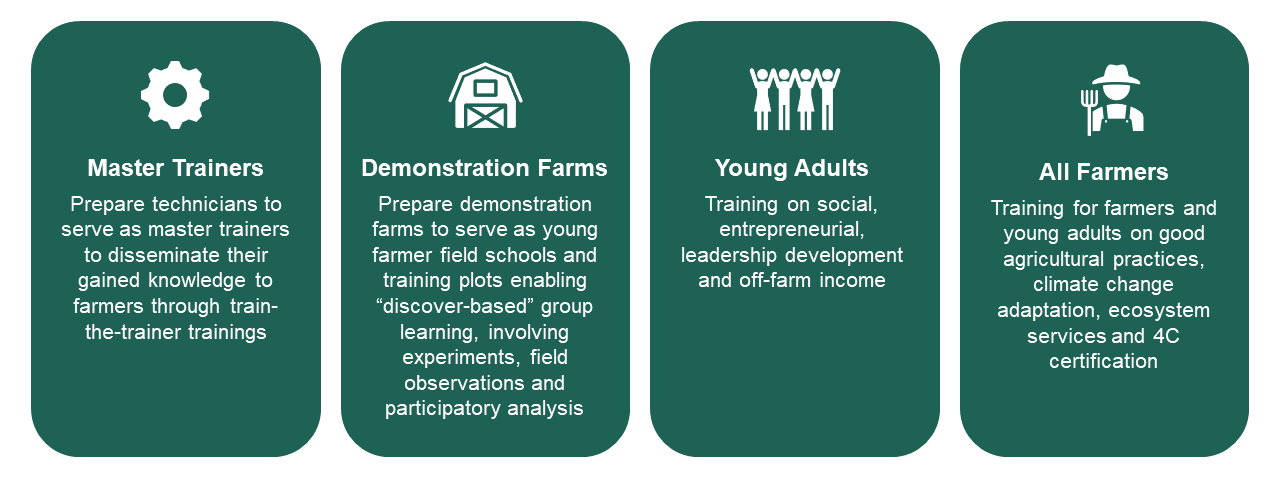
“Within the framework of the DeveloPPP project, we will be able to generate important synergies with relevant actors in the supply chain to contribute to the profitability of coffee growing and the well-being of coffee growers”, concluded Diego Robles Marcucci from FNC.
Further information on the project and the results of the baseline study can be found here.
About the develoPPP program
develoPPP is a program launched by the German Federal Ministry for Economic Cooperation and Development (BMZ) in 1999 in order to foster the involvement of the private sector in areas where business opportunities and development policy initiatives overlap. DEG is one of the two official partners appointed by BMZ to implement the develoPPP program on its behalf.
